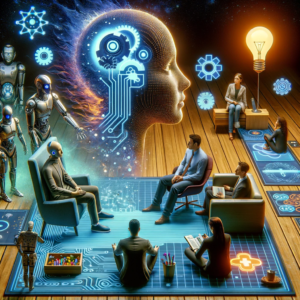The Transformative Impact of AI on Psychotherapy: A Vision for the Future
In an era where the scientific understanding of health increasingly overshadows traditional approaches, the imperative for evidence-based therapy has never been more pronounced. As we venture further into this journey, the intersection of artificial intelligence (AI) and psychotherapy emerges as a beacon of hope, promising to redefine the contours of therapeutic practice. This post delves into how AI could elevate the realm of psychotherapy, making it more effective, accessible, and personalized.
Real-Time Monitoring and Tailored Treatment Plans
At the heart of this transformation lies the potential for real-time monitoring through AI. By analyzing a wealth of data on a client’s emotional state, behavior, and biometrics, AI can offer unprecedented personalization in therapy. This approach enables therapists to adapt treatment plans dynamically, ensuring they remain perfectly attuned to the client’s evolving needs. The precision and adaptability offered here mark a significant departure from the static nature of traditional therapeutic models.
Global Depository for Therapeutic Knowledge
Imagine a future where a global database exists for therapists to share and access collective insights and outcomes. This AI-driven repository could become the cornerstone for developing effective treatment plans, benefiting from the wisdom of the global therapeutic community. Such democratization of knowledge not only fosters innovation but also levels the playing field, ensuring that the most effective therapeutic practices are accessible to all.
Enhanced Feedback Loops
One of the perennial challenges in psychotherapy is the accurate assessment of therapeutic effectiveness. AI can offer a solution through objective, data-driven feedback, minimizing bias and enabling therapists to refine their practice with precision. This development promises to improve the quality of care delivered to clients, ensuring that therapy is both effective and responsive to their needs.
AI-powered Individualized Therapists
The prospect of AI-powered therapists, personalized to meet the unique needs of individual clients, is perhaps the most ambitious vision of all. Such therapists could leverage global data to provide support that is both immediate and finely attuned to the client’s psychological profile. This represents a future where mental health services are not only more accessible but also more effective, extending the reach of psychotherapy to those who need it most.
The Role of Human Therapists in an AI-driven Future
As AI assumes a larger role in therapy, human therapists will likely find new avenues that capitalize on their inherent qualities, such as empathy and the capacity for deep, interpersonal connections. Whether through community-based roles or private mentorship, the human therapist’s role will evolve, emphasizing the unique value of the human touch in the healing process.
Conclusion
The integration of AI into psychotherapy holds the promise of revolutionizing mental health care, making it more personalized, accessible, and effective. This vision, grounded in the ethical and compassionate application of technology, offers a glimpse into a future where the synergy between human insight and AI-driven innovation transforms the landscape of mental health services, offering hope and healing on a global scale.
SEO Meta-Description: Explore the transformative impact of AI on psychotherapy, promising a future of personalized, accessible, and effective mental health care. Discover how AI can revolutionize real-time monitoring, treatment plans, and global therapeutic knowledge.
Source of Inspiration: An introduction to counselling research (1/3): Why is research important? – YouTube
FAQs
How can AI improve the personalization of therapy? AI can analyze vast amounts of data on a client’s emotional state, behavior, and biometrics to tailor treatment plans in real-time, ensuring they align with the client’s current needs.
What role does a global depository for therapeutic knowledge play? Such a depository, powered by AI, allows therapists to share and access collective insights and outcomes, democratizing knowledge and fostering innovation in treatment methodologies.
Can AI accurately assess the effectiveness of therapy sessions? Yes, AI can provide objective, data-driven feedback on therapy sessions, reducing bias and improving therapists’ ability to gauge and enhance their effectiveness.
What is the future of AI-powered therapists? AI-powered therapists, personalized for individual clients and informed by global data, could provide immediate, effective support based on a comprehensive understanding of the client’s psychological profile.
Will human therapists become obsolete with the advent of AI? No, human therapists will find new roles that leverage their unique qualities, such as empathy and the ability to form deep interpersonal connections, emphasizing the irreplaceable aspects of human touch in therapy.
How does AI promise to make mental health care more accessible? By harnessing technology, AI can offer more effective, personalized therapy options, expanding the reach and impact of mental health services to a broader audience.






